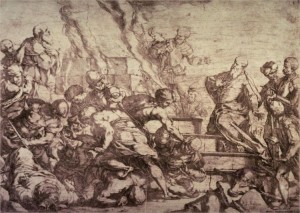1 Kings 18:20-21, (22-29), 30-39
This text is used for the Lectionary Year C on May 29, 2016.

The lyrics of the old hymn are:
He didn’t bring us this far to leave us.
He didn’t teach us to swim to let us drown.
He didn’t build His home in us to move away.
He didn’t lift us up to let us down.
Faith is often strengthened and rejuvenated simply by remembering what God has done. There is great merit in the admonition to “count your many blessings; name them one by one.” God is faithful. Not sometimes. All the time. God is love. Not as a whimsical emotion, but as the very core of His being. The prolific songwriter, Dottie Rambo, said it like this:
Roll back the curtain of memory now and then.
Show me where You brought me from and where I might have been.
Remember I’m human and humans forget,
So remind me, remind me, Dear Lord.
Remembering the faithfulness of God and all He has done fires our passion, fuels our commitment, and causes us to cry out with unwavering faith, “Do it again, Lord!”
The nation of Israel was in the third year of the promised drought. King Ahab well remembered the day that the Prophet Elijah had stood before him and boldly declared that a drought was coming and that it would not rain until the prophet of God said so. After Elijah turned around and left the King’s presence, it was not long before the parched throats of animals and humans were crying for relief, and Ahab started sending messengers all over the known world hunting for Elijah. During those years of Ahab’s searching, Elijah was spending time alone with God in the wilderness and time in the heart of a land ruled by Queen Jezebel’s heathen father. While Ahab and the people of Israel had been struggling for every drop of water and crumb of bread to stay alive, Elijah had witnessed over and over again how Jehovah was God of all creation and all provision. Ahab was finally desperate enough to go out looking for Elijah himself. He didn’t need to. Elijah was heading toward him. It was time to deal with the evil of Baal idolatry head-on.
The first words exchanged between the king and the prophet were a precursor for what was to follow. Ahab began with name-calling, “you troubler of Israel!” Elijah clarified for him, “That would be you! I haven’t troubled Israel, but you have with your outright abandonment of Jehovah and your embracing of Baal!”
Armed with three years of seeing first-hand the truth of the meaning of his own name, “my God is Jehovah,” Elijah was ready with a scathing reproach for the people and a daunting proposal for their religious leaders. He scolded the people for going back and forth between Jehovah and false gods (18:21). Then he challenged the 450 prophets of Baal and the 400 prophets of Asherah to a public demonstration that would settle the question of which god was truly God. Altars would be built. Wood would be stacked. Animals would be slain. Prayers would be prayed. Whoever answered and consumed the sacrifice would be God. There is no indication that Elijah wavered in his confidence for one minute. He knew the God he served.
Elijah let the others go first and gave them all the time they wanted. The 850 false prophets took most of the day to cry and beg and mutilate themselves in an effort to get their gods to hear and respond. It was a loud and bloody scene. Elijah did not remain silent. He taunted them for the absurdity of their beliefs. He hated what their religion stood for and how far their idolatry had dragged the people of Israel from the righteousness of Jehovah.
When it was his turn, Elijah went a step farther than just usual sacrifice preparation and had the altar, wood, and sacrificial animal soaked with water. Then he called upon God…but in a stunning way. He prayed to the “God of Abraham, Isaac, and Israel” (18:36). That phrasing had been used only once before, and that was by God Himself when He spoke to Moses at the burning bush before the Law was ever given. In other words, it was out of flaming fire that Jehovah God had revealed Himself and proclaimed who He was. It is not without significance that Elijah used that name to call for fire from Heaven to consume the sacrifice and declare once again who the true and living God really was.
God did what His servant asked. The “fire of the Lord” (18:38) consumed not only the sacrifice but also the wood, the stones, the dirt, and the water. What was the response to Elijah’s faith and God’s power? The people who had been wavering, unsure of whom to worship “fell on their faces and said, ‘The Lord indeed is God’.” (18:39).
Elijah remembered the name of God. Elijah remembered the works of God in his own life and in his various places of ministry and times of need. He could not deny his own history with Jehovah. He knew he was still serving the same God. He was convinced God had brought him and would not “leave him,” had taught him and would not “let him drown,” had built in him and would not “move away,” and had lifted him and would not “let him down.” His memories empowered him and emboldened him to challenge a king and shape a nation.
Dr. Vicki Vaughn
Executive Director
Richard Jackson Center for Evangelism & Encouragement, Brownwood, Texas
jacksoncenter@verizon.net
Tags: memories, faithfulness, boldness
